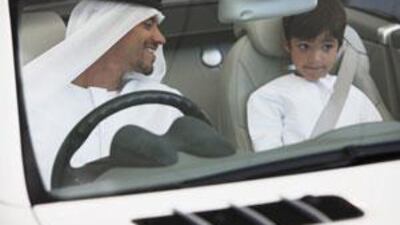ABU DHABI // Seat belts and child car seats will be mandatory for children in cars starting next year, a senior official pledged yesterday. Brig Gen Ghaith al Zaabi, the director of the federal traffic department, said his staff was drafting a sweeping new law to save children from being killed in car accidents.
It would be ready by the end of the year, he said, and probably implemented shortly thereafter. "No doubt ... the law will help reduce the number of road casualties among children," said Brig Gen al Zaabi. "International traffic and road studies have proved that restraining children in their seats has a massive impact on reducing injuries among children." Hundreds of youngsters die in road accidents each year in the UAE but there is no federal law mandating child restraints.
At the moment, the only legal provision is the black points system, which states that children under 10 must not travel in the front seat of a vehicle. This week, doctors warned parents who failed to strap their children into car seats that they risked turning them into "human missiles" in the event of an accident. Gen al Zaabi, whose department is part of the Ministry of Interior, said the law would apply to all children in every emirate. Children older than six would have to wear a seatbelt; those under that age will have to travel in child safety seats.
He declined to reveal many more specifics about the proposed law, saying ministry officials were still hammering out details. The National has been campaigning for child car seats and other measures to cut the number of injuries and deaths on the country's roads in its Road to Safety campaign. The initiative, launched last July, was prompted by the deaths of three sisters who were hit by a car as they crossed a road in Abu Dhabi.
Between 2000 and 2006, 450 children under 14, who were not wearing seat belts or restrained in child seats, died in road accidents in the UAE, according to ministry statistics. Two thirds of the victims were under four. Experts welcomed the move towards legislation. Dr Moin Fikree, the clinical director of the Rashid Hospital emergency and trauma centre in Dubai, said: "It will be remarkable if everyone starts to buckle their children in. It will make such a difference to what we see here."
"Hospitals could maybe provide car seats but everyone will need to be shown how to fit them correctly, this is important," he said. "The whole community needs to be involved in making sure the legislation has a real effect on people's behaviour." According to Salama, a road safety public awareness initiative, unrestrained children are 10 times more likely to die in traffic accidents. The risk of severe and fatal injuries to children under five who are restrained is cut by 70 per cent. John Hughes, the head of the Dubai office of the road safety research group ARRB, said it was "critical" that any child in a vehicle was restrained in a seat appropriate for his age. He backed the need for legislation, but said it would need to be properly enforced if it was to have any effect. "Every crash has three collisions," he said. "Firstly, your car hits another object or something at the side of the road. Then your body hits the seat belt, air bag or the front windscreen. Thirdly, your internal organs hit your ribcage, potentially causing serious damage. It is the second one where the car seats would come into play and avoid the third." Dr Mohammed el Sadig, an expert in safety promotion and accident prevention at UAE University, said the legislation needed the involvement of the whole community and penalties for not complying with the law should provide a tough deterrent. "It needs to be more than fines, people will pay them and not care," said Dr el Sadig. "Everyone needs to be educated about why it is important, why it saves lives." Bernadette Bhacker, who runs a road safety awareness campaign in Oman - Salim and Salimah - welcomed the announcement, which, she said, showed that the UAE was "leading the way" in road safety in the region. Intensive education campaigns would be needed to persuade parents to follow the law, she said. Tomas Ernberg, the regional managing director of Volvo Cars Middle East, described legislation as a "big step forward, a very important step". Duncan Vernon, the road safety manager for England at Britain's Royal Society for the Prevention of Accidents, said the message needed to be hammered home to parents. "It's important that people reflect and think about what priorities they have for their children, and taking them in the car is one of the most risky things you can do," he said. "Things such as the cost of a car seat should not be a barrier to keeping them safe compared to the risk you take without it." hhassan@thenational.ae munderwood@thenational.ae mchung@thenational.ae * The National

